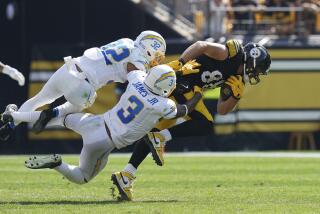Players try to absorb NFLâs helmet-to-helmet actions
A meeting of the helmets? The NFL is intent on curtailing those.
A meeting of the minds on the issue? Good luck with that.
On Tuesday, the league fined â but did not suspend â three players for dangerous hits in Sundayâs game, docking Pittsburghâs James Harrison $75,000, and dinging New Englandâs Brandon Meriweather and Atlantaâs Dunta Robinson $50,000 each.
A spokesman said the league wants to give players fair warning before suspending them for such hits, and will send a memo to all 32 teams Wednesday about the changes in disciplinary action.
The topic is both explosive and divisive among NFL players, creating a difficult conflict for a league trying to win over players as the sides head into turbulent labor negotiations.
On one side are offensive players who obviously donât want to absorb those type of hits. On the other are defenders who have long felt the game is already tilted heavily in favor of their offensive counterparts.
âI think it would be totally unfair for the league to begin to use disciplinary actions and to take away the way that somebody provides for their family because they play the game too hard,â said San Diego linebacker Kevin Burnett, who was under scrutiny for a tackle Sunday that jarred the helmet off scrambling St. Louis quarterback Sam Bradford.
âWe â and I say âweâ as a football community â need to look at that. Youâve been trained to tackle one way your whole life: Use your facemask, your shoulder pads and all this stuff. So now youâre basically telling me to run up to a guy with my chest open and my head back, and let him put his helmet and his protective equipment into my chest and have me make a tackle going backwards? Thereâs more injury in pulling off a guy than actually exploding and running through a guy.
âStop the running backs from lowering their heads, stop the fullbacks from lowering their heads, stop the offensive linemen from lowering their heads, and then we can have this discussion.â
As of Monday afternoon, Burnett hadnât seen the hits Harrison delivered on Clevelandâs Joshua Cribbs and Mohamed Massaquoi. He did, however, check on the one Robinson had on Philadelphiaâs DeSean Jackson â a collision that drew a flag for unnecessary roughness and knocked both players out of the game with concussions.
âWasnât a dirty hit,â Burnett said. âWas a legal hit.â
But Burnett wouldnât have to go too far to find someone with a different perspective on the issue. Just across the locker room is Chargers receiver Patrick Crayton, who knows the feeling of being defenseless and exposed with a tackler looking to separate his head from his body.
âWhen you come in to tackle, sometimes helmets collide,â Crayton said. âBut when a guyâs suspended in the air, and you launch yourself at his head, come on now.â
Crayton was speaking in general terms, not about Burnettâs hit on Bradford, but said itâs easy to tell when a player is headhunting as opposed to playing sound, fundamental football.
âYou can tell because usually their hands go down and itâs just a straight lineâ to the head, he said. âA missile almost.â
There were so many brutal and borderline hits Sunday â ones that sidelined several players with concussions â that the NFL felt compelled to take action.
âWeâre certainly concerned,â Ray Anderson, the NFLâs vice president of football operations and a member of competition committee, told the Associated Press. âThe fundamentally old way of wrapping up and tackling seems to have faded away. A lot of the increase is from hits to blow guys up. That has become a more popular way of doing it.
âYes, we are concerned they are getting away from the fundamentals of tackling, and maybe it has been coached that way. Weâre going to have to look into talking to our coaches.â
This is a very tricky issue, and one that goes beyond what happens on the field. The league has to do what it feels is right to protect the players and the integrity of the game. Yet if enough players feel that itâs entirely unfair to start handing out suspensions for dangerous tackles â and thatâs a very subjective business â it could create even more friction in negotiations for a new collective bargaining agreement (the current one expires in March).
Thatâs not to say the league shouldnât take every measure to avoid a potentially catastrophic outcome. And itâs not just offensive players who are at risk. Just look what happened to Rutgers defensive tackle Eric LeGrand, who was paralyzed from the neck down Saturday when he suffered a spinal cord injury making a tackle against Army.
But, like a receiver running across the middle, the NFL also has to proceed with caution.
The intent might be to protect brains, but â at least to guys on one side of the locker room â handing out suspensions isnât a no-brainer.
twitter.com/LATimesfarmer
More to Read
Go beyond the scoreboard
Get the latest on L.A.'s teams in the daily Sports Report newsletter.
You may occasionally receive promotional content from the Los Angeles Times.










